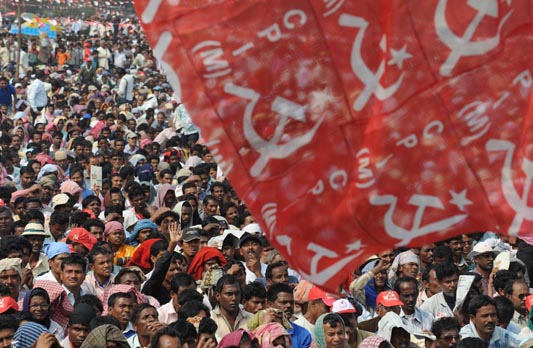
FIFTY YEARS OF CPI(M): A Historic Anniversary
Prakash Karat
THE formation of the Communist Party of India (Marxist) marked an important stage in the Communist movement of the country. Fifty years ago, 32 members of the National Council of the Communist Party of India walked out of the National Council meeting and decided later to re-found the Communist Party based on a new Programme. On this historic anniversary, we commemorate the role played by this section of the leadership of the united party. The core was constituted by nine members of the first elected Polit Bureau at the seventh Congress – P Sundarayya, EMS Namboodiripad, Harkishan Singh Surjeet, A K Gopalan, Jyoti Basu, Promode Dasgupta, M Basavapunnaiah and P Ramamurthi. Out of the 32 members of the National Council, only two are with us today – V S Achuthanandan and N Sankariah.
The Seventh Congress of the CPI(M) in November 1964 marked a break with revisionism and the resolution of a decade-long struggle within the united Communist Party on the basic question of what should be a revolutionary path – the strategy.
The Party Programme adopted in 1964 has stood the test of time and practice in its core features. The characterisation of the Indian State as one which is an instrument of the bourgeois-landlord classes led by the big bourgeoisie, which is increasingly collaborating with international finance capital effectively, dispelled the illusions about the Indian bourgeoisie fostered by revisionism. At the same time, it laid the basis for rejecting the Left sectarian stand that characterised the bourgeoisie as comprador and the Indian State as semi-colonial.
Since then, the CPI(M)’s theory and practice have been governed by a sturdy independence and adherence to apply Marxism to the concrete conditions of the Indian society. It is this independent approach which helped the CPI(M) to withstand the various political and ideological deviations which occurred in the international Communist movement and which had its adverse effects on the movement in India.
In the five decades of its existence, the CPI(M) has distinguished itself by a consistent working class outlook in its politics and activities. The Party has been organising the working class, peasantry and the agricultural workers to develop the class struggles and to make these classes a political force. In these struggles, innumerable Party members have sacrificed their lives and become martyrs.
The CPI(M) has carried forward earlier anti-feudal struggles against the oppressive social order. Even after nearly seven decades of independence, caste oppression and social oppression of women, adivasis and minorities prevail. The Party has been endeavouring to fight against all forms of social oppression along with the struggle against class exploitation.
The CPI(M) has been participating in parliamentary and electoral politics in order to mobilise the people around an alternative set of policies. In this process, the Party along with the Left was able to win majority support in the three states of West Bengal, Kerala and Tripura. The CPI(M) and the Left-led governments of these three states in the past five decades have achieved land reforms within the limitations of the present Constitution, ensured decentralisation of powers to the panchayati raj system, upheld secularism and safeguarded the democratic rights of the working people.
The CPI(M) has emerged as the largest Left party in the country. It has today over one million Party members and works in mass and class organisations which have a total membership numbering nearly 70 million. However, in recent years, the Party has suffered electoral reverses and is facing severe attack in its strongest base in West Bengal.
India is faced with a rightwing offensive after the advent of the Narendra Modi government. Hence there is an urgent need to strengthen the CPI(M) and the Left and democratic forces. On the 50th anniversary, we have to rededicate ourselves to make the CPI(M) a strong all India Party which has millions of members and which commands the influence of wide sections of the working class and other sections of the working people. We should pledge to build the Left and democratic alternative which is the real alternative to the bourgeois-landlord parties and their policies. This should be the resolve of the entire Party on this historic anniversary.


